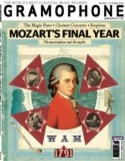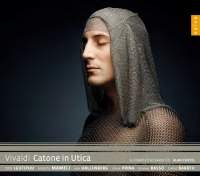Texte paru dans: / Appeared in: |
|
|
Reviewer: David
Vickers
Ciccolini revives
Vivaldi’s 1737 opera with reconstructed Act 1
The music for Act 1 is lost, so it has been skilfully constructed by Alessandro Ciccolini, whose meticulous essay suggests why his work is more persuasive than a previous valiant effort by Jean-Claude Malgoire. As Ciccolini demonstrated before with his masterly completion of Motezuma (also recorded by Alan
Curtis – Archiv, 4/06), he has a finely attuned sense of the Red Priest’s style; on this occasion he has composed five of the Act 1 arias using thematic material derived from Vivaldi’s instrumental works and explains that he prefers this flexible solution to simply modifying arias borrowed from other operas.
The introductory Sinfonia (lifted from L’olimpiade)
is played with effervescent dynamism by Il Complesso Barocco and Curtis directs
with astute dramatic pacing. The entire cast performs superbly: Topi Lehtipuu
demonstrates authoritative potency and rhetorical intelligence befitting of Cato,
and produces an explosive performance of ‘Dovea svenarti allora’ (a bitter
tirade upon discovering that his daughter loves his enemy); Roberta Mameli
(Cesare) sings with sparkling technique, characterful conviction and sentimental
versatility in music ranging from the gorgeously murmured love aria ‘Se mai
senti spirarti sul volto’ to the furious trumpet aria ‘Se in campo armato’; Ann
Hallenberg (the vengeful widow of Pompey), Sonia Prina (Catone’s daughter) and
Romina Basso (a legate of the Roman senate) are probably the finest three
mezzo-sopranos in the current Baroque opera business; the beleaguered Arbace is
sung passionately by Emo˝ke Baráth. Ciccolini and Curtis deserve enormous credit
for transforming an incomplete obscurity into a coherent and compelling opera –
although Vivaldi’s own final scenes are a perfunctory anti-climax. |
|
|
|
|
|
Cliquez l'un ou l'autre
bouton pour découvrir bien d'autres critiques de CD |
|




